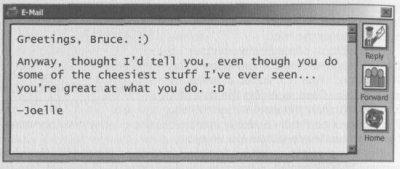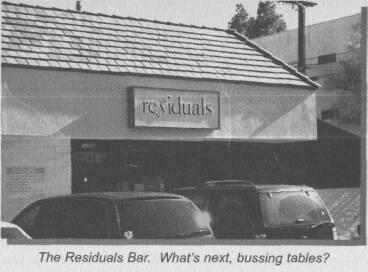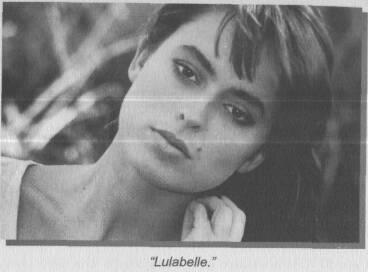If Chins Could Kill: Confessions of a B Movie Actor (36 page)
Read If Chins Could Kill: Confessions of a B Movie Actor Online
Authors: Bruce Campbell
Tags: #Autobiography, #United States, #General, #Biography & Autobiography, #Biography, #Entertainment & Performing Arts - General, #Entertainment & Performing Arts, #Actors, #Performing Arts, #Entertainment & Performing Arts - Actors & Actresses, #1958-, #History & Criticism, #Film & Video, #Bruce, #Motion picture actors and actr, #Film & Video - History & Criticism, #Campbell, #Motion picture actors and actresses - United States, #Film & Video - General, #Motion picture actors and actresses

"Making fun of the tough situation I'm in..."
"What do you mean?"
"What do you mean, what do I mean? The car thing, the fucking car..."
I realized at this point that Goodman wasn't aware of the full scope of the joke -- he thought we were simply making fun of his legal dilemma. I had to explain to him, in great detail, that it was
all
fake -- the stripped car, the Flaming Gorge scenario, the warrant --
everything.
"Oh," Dave said as his eyes rolled back in his head.
From his reaction, I couldn't tell if he was going to stab me with a butcher knife or hug me.
"Oh, man... what a shrek! What a
great
shrek!"
Shrek
is an old term for "gag" and Goodman knew it well -- he had delighted in many a shrek. Now, he started laughing -- hard. I'll say this for the poor bastard, he knew a good gag when he saw one. He commended John and I for the elaborate preparation and grilled me for the next hour about how we pulled it off.
I'm still waiting for Goodman's payback. Waiting and trembling...
GOING SOUTH IN NORTH HOLLYWOOD
After dodging the affiliation for as many years as I possibly could, I now found myself an official member of the "down-and-out actor, living in a crappy apartment in Hollywood" club. It had been a while since I had to worry about stereo noise or "deposits" and all the rest of that "single guy" stuff.
From my apartment, I could hear the muffled thump of music emanating from an actor's bar, Residuals. Good lord, what was next: bussing tables, a subscription to
Dramalogue?
I had done an end run around the system for ten years, but now I was warming the bench. The concept of being an actor was one thing, but
feeling
like one gave me the willies...
Having been a poster child for
Fangoria
magazine, it made sense that I wound up in their first film production,
Mindwarp.
Eagle River, Wisconsin, is the snowmobile capital of the world, though apparently this wasn't enough because some enterprising fool decided that a film studio in the frozen north would supply a great need.
I was pleased that at least part of this "apocalyptic"
Jeremiah Johnson
was filmed in Michigan -- Gay, Michigan, to be exact. Local entrepreneurs at the town's bar printed up T-shirts proclaiming, "Go
straight
... to the
Gay
bar." In a town of thirty-four, you've got to fill the time any way you can.
At a cast and crew brunch, I spotted a cute woman across the room, sitting with a bunch of stuntmen. She was attractive, but a leather biker's cap pulled low across her eyes made her look tough. I had actually talked with her on the phone before the shoot. Ida Gearon was the costume designer and she needed my sizes to prep the costumes.
Ida: So, you're playing the lead guy -- are you really tall or something?
Bruce: No, not really -- about six feet one inch with boots.
Ida: Well, then, are you really buff or anything?
Bruce: No, not really...
Ida: Then why did they cast you?
Bruce: What do you care? Look, do you want my sizes or not?
Eventually, we warmed up to each other and it was a good thing -- the location was an abandoned copper factory on the shores of Lake Superior, and the shoreline was still clogged with ice flows. My character had to wear "nonseasonal" clothing, so filming would churn along until I could no longer feel my hands, then I'd pile into a waiting van, "defrost" them on the heating vents, and get back at it.
Shooting in the warehouse/studio wasn't much better. My character is captured at one point and tossed down a labyrinth of landfill tunnels. This effect was accomplished by a "Mazola" slide -- it wasn't that some guy named Mazola invented it, the slide was lubricated
with
Mazola cooking oil -- gallons of it. The oil had been used by stunt men for several days before the actors were brought in, and by the end of the day, I smelled like a bucket of "extra crispy" KFC.
My character is then forced to dig as a laborer in the tunnels, under the supervision of "crawlers." The art director, hoping to save money, brainstormed that they could just get the tunnel dirt from a real landfill.
It became a daily challenge among my fellow actors to find the most heinous substance lurking within the dirt. Motor oil was one of them, so our wardrobes turned a slightly darker shade every day. Broken glass was not uncommon, as well as rusty nails and scrap metal. I won the prize with an archaeological find of asbestos, removed from an Eagle River school years before.
It really wasn't a surprise when I got a nasty cut in the "dirt" one day. The immediate concern wasn't whether I would be all right, it was more about whether shooting could continue. Since the same makeup effects guys from the
Evil Dead
days were supervising this film, I knew what items they carried in their set bags and immediately asked for some "355."
This stuff, now discontinued because of its questionable manufacturing process, was surgical adhesive, developed in the rice paddies of the Vietnam War -- in the heat of battle, it could be poured directly into wounds for a quick fix. This was as close to war as I'd ever been, so I glued my finger shut, covered it with dirt, and went back to digging...
33
SECOND TIME IS THE CHARM
I wasn't sure whether the "trench affair" Ida Gearon and I just experienced would translate to Los Angeles. Often on a film set, cast and crew members become unusually close, but many of these "relationships" crash and burn once people return to their former lives -- or should I say
wives?
Fortunately, Ida and I flourished in neutral territory and it was a huge relief to see first hand that life actually continued after divorce.
Well aware of pop-psychology terms like "rebound relationships," I was determined to follow my gut. From the moment I spotted Ida in Eagle River, Wisconsin, I knew I had to find out what her deal was, so I enlisted my co-star, Marta, to dig up the dirt. After a day of shooting, she reported back, but the news was mixed: Ida was in a relationship with a production manager in Los Angeles, but it was "on the rocks."
Okay,
I plotted to myself,
at least there's a window of opportunity...
The first step was getting to know Ida better. I could do this by hanging around the wardrobe room, but I'd have to have a decent excuse. Aside from the fact that their department was the only place with a decent heating system, I argued that my postapocalyptic character had to know primitive survival skills.
Ida: (a little peeved) You want to do what?
Bruce: I want to learn how to sew.
Ida: Well, look, as you can see, we're a little busy here. They didn't give us much time to prep.
Bruce: Yeah, but I don't need one of your sewing machines. My character would maintain his clothes by hand, (vamping now) He'd... he'd sew like Fred Flintstone would -- with leather thread and... and stuff like that... yeah...
Ida: But, why bother? I didn't see any sewing scenes in the script.
Bruce: (in ad-lib overdrive) Well, true, but in scene thirty-two, I have that long chat with Marta. My character wouldn't just sit there, he'd be doing something... like... sewing.
Ida: (rolling her eyes) Okay, big guy, whatever floats your boat. I'll set you up.
At least I got a foot in the door. For the remainder of the short shoot, I spent every opportunity refining my pioneer skills.
Ida got the hint pretty quickly that it was all a ploy to hang around her, but she didn't seem to mind. By the second week of shooting, we began to spend time together off the film set.
It's an individual thing, but eventually I get to the point in a relationship where it either intensifies (as in consummates) or comes to an end. Personally, I was eager to apply the lessons I had learned from my first go around. Ida had never been married before, but she seemed interested enough to give it a whack. Within a year of meeting, we decided to go for it. This time around, our wedding ceremony was exponentially larger -- all of twenty people were invited. We chose another non-denominational church in North Hollywood known simply as "The Little Brown Church." Ronald Reagan married Nancy in the same building, and I'm not sure if that's good or bad, but it seemed to work for them.
Now that I had two small children, the dynamics of the ceremony were quite different, so I gave the kids designated jobs. Rebecca, who was seven, made a lovely flower girl, and she preceded Ida down the aisle, tossing petals in every direction. Andy, all of four, took the place of Celia Raimi as the ring-bearer. Because we weren't sure how he was going to perform under pressure, we pinned the ring to his miniature cardigan.
The actual service went faster than any of us could have anticipated. Ida raced down the short aisle (I assumed this was a good thing), and we churned through the vows in record time.
Following the reception, you might assume that Ida and I immediately jumped on a plane to some far-flung tropical island for a week of bliss. For two people in the entertainment industry, this was not to be. Back home in North Hollywood, we shared a laugh then looked at each other with a nod.
"Okay, back to work!"
34
A FLY ON THE
DARKMAN
WALL
Revelation #8:
The lowest common denominator is not only alive in Hollywood -- it is revered.
Mindwarp
paid off some debts, but I needed another source of income. Out of nowhere, a behind-the-scenes job bailed me out -- my official job description was "temp sound guy" for Sam Raimi's
Darkman.
Sam: I wanted to produce a movie, but I didn't think it was a good enough story to direct it.
Bruce: It was your story.
Sam: Yeah. I really wanted to make
The Shadow.
But Universal Studios wouldn't give me the rights to that. I met with them, but they didn't like my views at all, so I went, "I'm just gonna write my own superhero."



